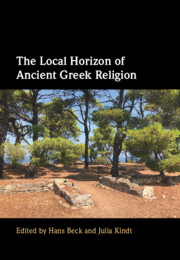Book contents
- The Local Horizon of Ancient Greek Religion
- The Local Horizon of Ancient Greek Religion
- Copyright page
- Contents
- Figures
- Contributors
- Preface
- Abbreviations
- 1 Localism and the Study of Ancient Greek Religion: The Example of the Divine Persona
- 2 Refitting the Local Horizon of Ancient Greek Religion (Including Some Remarks on the Sanctuary of Poseidon on Kalaureia)
- 3 Mycenaean Greek Worship in Minoan Territory
- 4 Hera on Samos: Between the Global and the Local
- 5 Polytheism and the Distribution of Votives in the Corinthia
- 6 Demeter Chthonia at Hermione: Landscapes and Cult
- 7 Local Variation in the Thesmophoria Festival: A Case Study of the Attic and Sicilian Thesmophoria Festivals
- 8 The Lindian Chronicle and Local Identity
- 9 Shifting Identities and Defensive Localism: Conflicts of Religious Narratives in Post-Synoikism Rhodes
- 10 Between Local and Global? Religion in Late-Hellenistic Delos
- 11 Personal or Communal? Social Horizons of Local Greek Religion
- 12 How to Write a Local History of Imperial Greek Cults: Observations from Pausanias
- 13 Panhellenic Sanctuaries: Local and Regional Perspectives
- Epilogue: A Tribute to Potnia of the Labyrinth
- Index
- References
1 - Localism and the Study of Ancient Greek Religion: The Example of the Divine Persona
Published online by Cambridge University Press: 06 April 2023
- The Local Horizon of Ancient Greek Religion
- The Local Horizon of Ancient Greek Religion
- Copyright page
- Contents
- Figures
- Contributors
- Preface
- Abbreviations
- 1 Localism and the Study of Ancient Greek Religion: The Example of the Divine Persona
- 2 Refitting the Local Horizon of Ancient Greek Religion (Including Some Remarks on the Sanctuary of Poseidon on Kalaureia)
- 3 Mycenaean Greek Worship in Minoan Territory
- 4 Hera on Samos: Between the Global and the Local
- 5 Polytheism and the Distribution of Votives in the Corinthia
- 6 Demeter Chthonia at Hermione: Landscapes and Cult
- 7 Local Variation in the Thesmophoria Festival: A Case Study of the Attic and Sicilian Thesmophoria Festivals
- 8 The Lindian Chronicle and Local Identity
- 9 Shifting Identities and Defensive Localism: Conflicts of Religious Narratives in Post-Synoikism Rhodes
- 10 Between Local and Global? Religion in Late-Hellenistic Delos
- 11 Personal or Communal? Social Horizons of Local Greek Religion
- 12 How to Write a Local History of Imperial Greek Cults: Observations from Pausanias
- 13 Panhellenic Sanctuaries: Local and Regional Perspectives
- Epilogue: A Tribute to Potnia of the Labyrinth
- Index
- References
Summary
This chapter explores how the local dimension of ancient Greek religion has featured in Classical scholarship. Kindt argues that the problem of location is intrinsic to the structure of ancient Greek religion, which, in the absence of traditional locations of authority, had multiple centres and peripheries. The way in which the Greeks conceived of the personalities of the gods and goddesses is a case in point: the idea of a unified existence as implied in the concept of the divine persona is challenged by the multiplicity of ways in which one and the same deity manifested itself in the human world. Three different ways in which Classical scholars have conceived of the categories of the local in relation to the Greek divine persona come into the picture here: as a realisation of the general, as the place at which variation occurs, and as two dynamic forces that variously intersect in different locations at which ancient Greek religion manifests itself.
Keywords
- Type
- Chapter
- Information
- The Local Horizon of Ancient Greek Religion , pp. 1 - 27Publisher: Cambridge University PressPrint publication year: 2023



